
 Dr Valerie Yule describes how our economic system removes our ability to choose what we really want and need.
Dr Valerie Yule describes how our economic system removes our ability to choose what we really want and need.
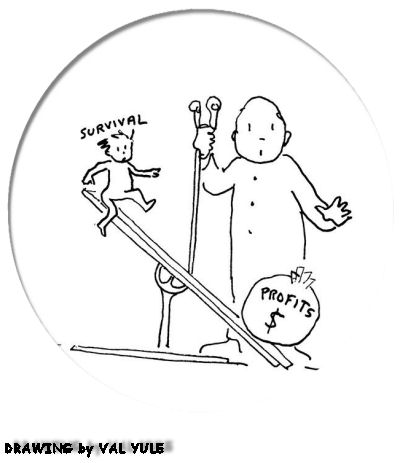
The Great Dilemmas
A major reason why we do nothing to stop our experiment in destroying the planet is that reining in our wasteful life styles would cost jobs and profits.
Stephen Emmett, an Oxford professor of Computational Science and head of the Microsoft Computational Science laboratory in Cambridge is the star of Ten Billion, a theatrical work which shows our planet's environmental tragedies with ‘compelling impeccable logic.’ He thinks we are ‘already fucked’ as humanity's experiment with the planet destroys ecosystems, eradicates other species, pumps more and more greenhouse gases into the atmosphere, temperature rises, swelling populations, rising middle-class aspirations, and spoils the ocean, air, water and soils. (Account in Guardian Weekly, by Robin McKie, ‘Climate change is big drama’, 17 August p 21)
Humans vs nature
Humanity is now using nature’s products 52 percent faster than what Earth can renew, according to Global Footprint Network’s latest data, published in the 2012 edition of the Living Planet Report.
And we do nothing.
A major reason why we do nothing is that reining in our wasteful life styles would cost jobs and profits. These would be especially in travel, production of really-not-needed goods, and retail.
Every one of us – including me - has some habits that could be changed to save resources and greenhouse emissions. Let us look at what would happen to a typical single-person household, if recent advances in waste were to be cut. (They are recent. Our grandparents were not so wasteful.)
Food – Eat less, especially processed foods, and be less obese – although this will cut jobs and businesses.
We heat our homes more than needed with central heating and cool them more than needed with air conditioners. That is because we have open-style housing and cannot shut the doors to where we are. We do not dress according to the weather. We could sit with an electric rug over our knees rather than heat the room.
Yet, change our ways and we cut jobs and businesses.
Our homes are designed to be ever more wasteful. Perfectly good houses are pulled down to build McMansions with no eaves, no gardens or yards, dark roofs and enormous rooms not all really needed.
Bathrooms at several per house, with square handbasins and baths with claw feet, with no regard for cleaning and waste of water. People wash their hair daily, and usually themselves, whether they need a shower or not.
Yet, change our ways and cut jobs and businesses.
We use appliances not only when needed, but when we really could do with ‘household exercise’ with carpet-sweepers, manual lawn mowers, and twin tub washing machines. Then we drive to the gym to get exercise.
Yet, change our ways and we cut jobs and businesses.
We wear the latest fashions and throw out rather than re-use the old.
Yet, change our ways and we cut jobs and businesses.
Travel on holidays and business include too many trips by plane. We go to our many conferences by plane, even when video-conferencing and email give us communication we did not have yesterday. 
Yet, change our ways and we cut jobs and businesses.
Commuting to jobs and shops is usually by one-tonne family-size vehicles, although many households have two cars. One of those cars could surely be a compact two-seater, that would save fuel, energy in the making, and cut traffic snarls in half. This would open a new field for car manufacturers.
In the laundry: Our appliances are made for big households for children and workers with lots of dirty clothes. We have these big appliances using excess water and energy for small households, with most of the washing being only to refresh most clothes. Yet people change their clothes whether they need to or not. They use hot water and too much detergent. They get new washing machines regularly.
Yet, change our ways and cut jobs and businesses.
Retail stores benefit particularly from selling big appliances that need replacing soon. We do not have updated electrics for the old carcasses.
Yet change our ways and we cut jobs and businesses.
We use electric dryers – often because there is no room for outside dryers. We iron. Today’s fabrics rarely need ironing – even pillowslips and hankies go smooth if folded and put away.
Yet, change our ways and cut jobs and businesses.
Furnishings are not mendable or renovatable. We could have mendable furniture and washable stretch coverings. Instead Council hard rubbish pictures show goods that have minimum defects as examples of what to throw out to the tip. Microsoft Spellchecker does not even recognize the words mendable or renovatable.
Yet, change our ways and we cut jobs and businesses.
Schools are large and centralized, so that whereas two generations ago most children traveled to school on foot or bicycle, now parents add to the traffic and costs by ferrying them. Small schools are better for small people, and can share online materials and specialist teaching. They would increase useful jobs – but to sell their land aids developers.
Families: Parents are still described as ‘generous’ if they have large families, whereas today to have a small family oneself and care abut other people’s children is true generosity. Most of the children that come into care were unwanted in the first place.Why encourage people to have children they do not want and cannot care for?
Pets: Do people consider that pets that eat meat, are over-large, and are too many. put another burden on the earth’s resources? Working dogs of course are another matter. Many people need cats to keep down vermin, but let them out at night to catch our wildlife birds and small creatures.
Yet change our ways and we cut jobs and businesses.
Our lifestyles have also become more wasteful with children’s toys, garden prunings, plastic bags, quickly obsolete electronic gear, waste of paper, re-using rather than recycling. Look around your home.
We need to go back to our grandparents’ saving ways and many of their appliances.
We need also to go forward – in sewage, for example, with separation of liquid sewage for local use as fertilizers and solids for centralized production of equally useful sludge. What a saving of water!
New jobs and new businesses could employ thousands, and people-care is still under-serviced.
The poor of the world look to live our life-styles. The planet staggers as they try. Our life-styles can be full of pleasure, and healthy too, in giving more chance for the earth to survive.
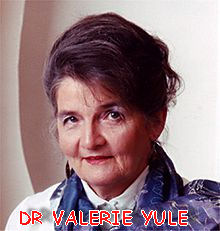
Valerie yule
About Dr Valerie Yule, M.A., Ph.D, Dip.Ed., M.B.Ps.S. Academic positions at Melbourne, Monash and Aberdeen Universities in departments of Psychology and Education; Teacher at all levels, from preschool to adult and migrant literacy and PhD supervision; Clinical child psychologist at the Royal Children’s Hospitals, Melbourne and Aberdeen; Schools psychologist chiefly but not only in disadvantaged schools, Present research on imagination and literacy.
 An estimated one to three species of insects and other native invertebrates are becoming extinct in Australia every week, according to a new study revealing the immense scale of the nation’s biodiversity loss.
An estimated one to three species of insects and other native invertebrates are becoming extinct in Australia every week, according to a new study revealing the immense scale of the nation’s biodiversity loss. 

 Dr Valerie Yule describes how our economic system removes our ability to choose what we really want and need.
Dr Valerie Yule describes how our economic system removes our ability to choose what we really want and need.


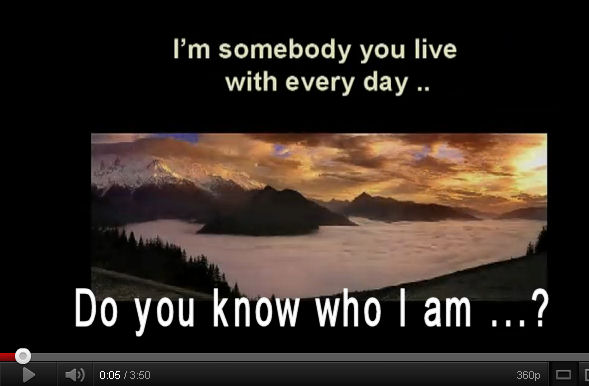
 Resource scarcity is the root of war and terrorism, and liberty is the first casualty of conflict. But as oppressive as state surveillance and detention can be, nature's noose will be even tighter.
Resource scarcity is the root of war and terrorism, and liberty is the first casualty of conflict. But as oppressive as state surveillance and detention can be, nature's noose will be even tighter.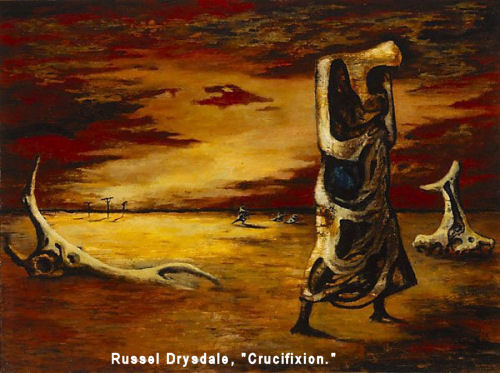
 The joke is on you, you green fool! You and your idiot faith without evidence! Your techno-optimism and cornucopian denial! Renewable technology? What a laugh! Who did you think you were kidding? Mr. Jevons? What a paradox! Smart growth? Ha! What's next, "Smart" cancer? "Smart" extinction? "Smart" deforestation?
The joke is on you, you green fool! You and your idiot faith without evidence! Your techno-optimism and cornucopian denial! Renewable technology? What a laugh! Who did you think you were kidding? Mr. Jevons? What a paradox! Smart growth? Ha! What's next, "Smart" cancer? "Smart" extinction? "Smart" deforestation?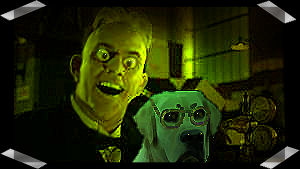

 Most objections to Australian Prime Minister Julia Gillard's Carbon Tax are founded on the apparent belief that it is possible for human society to continue its wasteful consumption of non-renewable natural resources and destruction of our natural environment without posing any risk to the life support system which exists in this tiny corner of a Universe, mostly barren of life.
Most objections to Australian Prime Minister Julia Gillard's Carbon Tax are founded on the apparent belief that it is possible for human society to continue its wasteful consumption of non-renewable natural resources and destruction of our natural environment without posing any risk to the life support system which exists in this tiny corner of a Universe, mostly barren of life.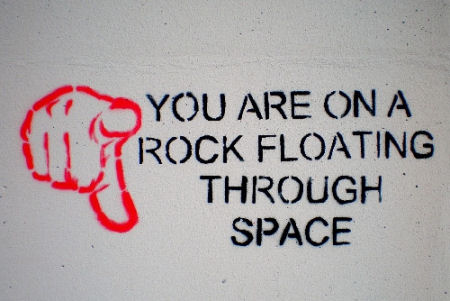

 Source of red devil figure was
Source of red devil figure was  Correspondence between two friends on the brink of major life changes driven by what looks to be climate change.
Correspondence between two friends on the brink of major life changes driven by what looks to be climate change.


 Without obtaining the prior mandate of the electorate, successive Australian governments have been seeking to establish a water-market in this country. For as long as the people of Australia are required to “buy-back” the nation’s water, especially during times of crisis, they will have no water security. Bidding-wars, as currently being waged by Senators Wong and Joyce, are now an unattractive and dangerous feature of Australian water policy: profits arising will be privatised but the impacts will be borne by the Australian public. The electorate of this country must be given the opportunity to indicate whether it wishes its water to be privatised and exposed to global speculation - or protected for future generations of Australians.
Without obtaining the prior mandate of the electorate, successive Australian governments have been seeking to establish a water-market in this country. For as long as the people of Australia are required to “buy-back” the nation’s water, especially during times of crisis, they will have no water security. Bidding-wars, as currently being waged by Senators Wong and Joyce, are now an unattractive and dangerous feature of Australian water policy: profits arising will be privatised but the impacts will be borne by the Australian public. The electorate of this country must be given the opportunity to indicate whether it wishes its water to be privatised and exposed to global speculation - or protected for future generations of Australians.
Recent comments